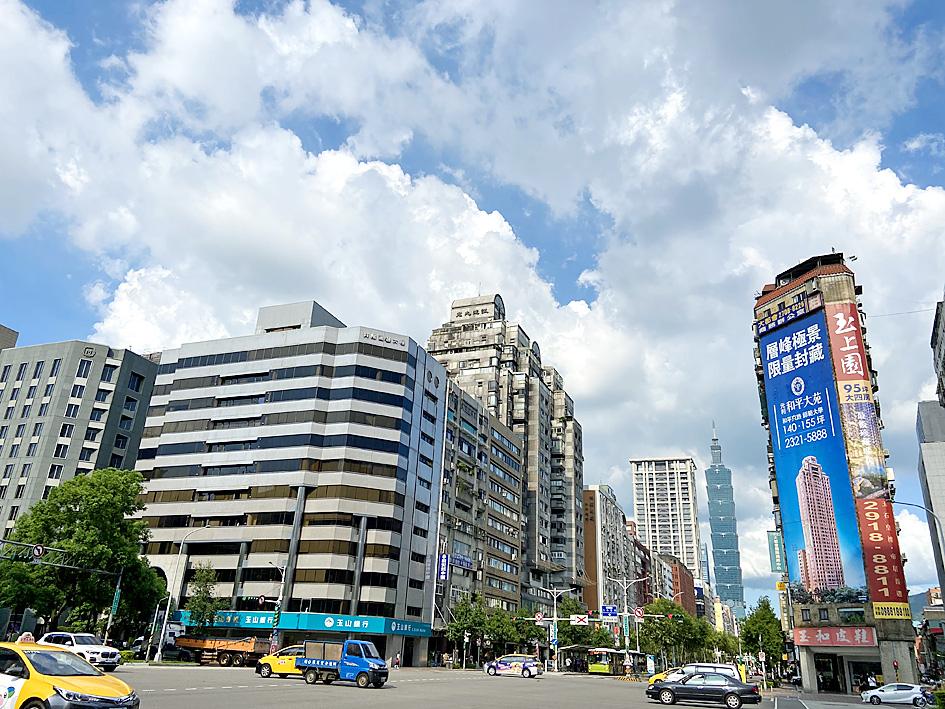New mortgages granted by five state-run banks last month reached the highest level since 2016, on the back of robust demand in the property market throughout the second half of last year, central bank data released on Friday showed.
New mortgages granted by Bank of Taiwan (臺灣銀行), Land Bank of Taiwan (土地銀行), Taiwan Cooperative Bank (合作金庫銀行), Hua Nan Commercial Bank (華南銀行) and First Commercial Bank (第一銀行) totaled NT$68.337 billion (US$2.41 billion), up 17.92 percent month-on-month and 13.13 percent year-on-year, the data showed.
This was the highest monthly issuance of mortgages since 2016, when the current integrated house and land sales tax was implemented, the data showed.

Photo: CNA
For the whole of last year, total new mortgages by the banks totaled NT$629.497 billion, up 6.23 percent from NT$592.553 billion in 2019, the highest in more than a decade.
The growing demand in the property market has driven up housing prices and triggered speculative transactions, especially in the presale property market, which last month prompted the government to introduce new measures to curb speculative transactions.
The new measures include stricter requirements on loans for real-estate buyers and developers, the disclosure of the actual-price registration system for property transactions, restrictions on option agreements for presale housing units, as well as stricter risk control over land and construction financing loans, and industrial land loans to prevent hoarding and speculation.
December is the traditional peak month for property transactions, the central bank said, adding that the measures to curb speculation would in a few months begin to affect the market.
The high number of new mortgages came on the back of a strong housing market in the six special municipalities, it said.
In Taipei, New Taipei City, Taoyuan, Taichung, Tainan and Kaohsiung, housing transactions totaled 26,225 last month, up 6.6 percent month-on-month and 17.5 percent year-on-year, concluding a strong showing in the past two quarters.
Housing transactions in the six cities totaled 250,175 last year, the highest in seven years and up 7.82 percent from 2019, Ministry of the Interior data compiled by the Taiwan Realty Enterprise Group (台灣房屋集團) showed.
Despite rising mortgage demand, the five banks’ average mortgage rate fell to 1.356 percent per year last month, down from 1.361 percent in November last year and 1.608 percent a year earlier, the central bank data showed.
Separately, the five banks’ average lending rates climbed to 1.291 percent last month, up 0.035 percentage points from 1.256 percent in November, the central bank said, attributing the uptick to higher costs for corporate loans.
Capital expenditure loans totaled NT$123.691 billion last month, the highest in 10 years, due to funding demand for corporate investment, and an increase in land and construction loans, the data showed.
The average capital expenditure lending rate was 1.739 percent last month, it showed.
Excluding government loans, the rate would be 1.316 percent, up 0.046 percentage points from 1.270 percent in November, the central bank said.

UNCERTAINTY: Innolux activated a stringent supply chain management mechanism, as it did during the COVID-19 pandemic, to ensure optimal inventory levels for customers Flat-panel display makers AUO Corp (友達) and Innolux Corp (群創) yesterday said that about 12 to 20 percent of their display business is at risk of potential US tariffs and that they would relocate production or shipment destinations to mitigate the levies’ effects. US tariffs would have a direct impact of US$200 million on AUO’s revenue, company chairman Paul Peng (彭雙浪) told reporters on the sidelines of the Touch Taiwan trade show in Taipei yesterday. That would make up about 12 percent of the company’s overall revenue. To cope with the tariff uncertainty, AUO plans to allocate its production to manufacturing facilities in

TAKING STOCK: A Taiwanese cookware firm in Vietnam urged customers to assess inventory or place orders early so shipments can reach the US while tariffs are paused Taiwanese businesses in Vietnam are exploring alternatives after the White House imposed a 46 percent import duty on Vietnamese goods, following US President Donald Trump’s announcement of “reciprocal” tariffs on the US’ trading partners. Lo Shih-liang (羅世良), chairman of Brico Industry Co (裕茂工業), a Taiwanese company that manufactures cast iron cookware and stove components in Vietnam, said that more than 40 percent of his business was tied to the US market, describing the constant US policy shifts as an emotional roller coaster. “I work during the day and stay up all night watching the news. I’ve been following US news until 3am

COLLABORATION: Given Taiwan’s key position in global supply chains, the US firm is discussing strategies with local partners and clients to deal with global uncertainties Advanced Micro Devices Inc (AMD) yesterday said it is meeting with local ecosystem partners, including Taiwan Semiconductor Manufacturing Co (TSMC, 台積電), to discuss strategies, including long-term manufacturing, to navigate uncertainties such as US tariffs, as Taiwan occupies an important position in global supply chains. AMD chief executive officer Lisa Su (蘇姿丰) told reporters that Taiwan is an important part of the chip designer’s ecosystem and she is discussing with partners and customers in Taiwan to forge strong collaborations on different areas during this critical period. AMD has just become the first artificial-intelligence (AI) server chip customer of TSMC to utilize its advanced

Six years ago, LVMH’s billionaire CEO Bernard Arnault and US President Donald Trump cut the blue ribbon on a factory in rural Texas that would make designer handbags for Louis Vuitton, one of the world’s best-known luxury brands. However, since the high-profile opening, the factory has faced a host of problems limiting production, 11 former Louis Vuitton employees said. The site has consistently ranked among the worst-performing for Louis Vuitton globally, “significantly” underperforming other facilities, said three former Louis Vuitton workers and a senior industry source, who cited internal rankings shared with staff. The plant’s problems — which have not